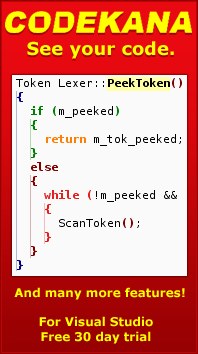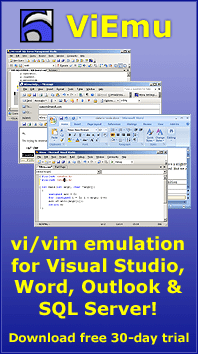ViEmu 1.2 released & next plans
Friday, September 30th, 2005I’ve just released ViEmu 1.2 a while ago. During the last weeks, I feel fully energized, and I’ve completed quite a lot of work.
I haven’t seen almost any traffic at all coming from the new articles, but then, Google doesn’t like my page a lot, so it’s understandable. Maybe I am in the dreaded “sandbox”, or maybe I’m missing some key stuff in the page. My consolation is that anyone who looks for “vi keystrokes visual studio” or anything remotely similar will decidedly find it through the many mentions that appear in the first search results page (my page is nowhere to be seen on the first 20 or so pages).
I thought I’d share my plans for the next steps, especially since I’m not working a lot in NGEDIT in the last times.
Well, actually a lot of the current work will reflect directly on NGEDIT. I already have the regular expression framework that will power ViEmu, but the good thing is that it’s written using the C++ string classes I talked about a while ago, so it will transplant directly to NGEDIT’s multi-format text processing engine (even if ViEmu only uses UCS-2 two-bytes-per-char support). I will be porting the latest code I did for NGEDIT, which is among the most innovative stuff, to this string support, which is evolving within ViEmu.
My intention is to focus on ViEmu for a while more – until I get it to a level with which I will feel comfortable. That means, basically, customers’ requests and vi (ex) command line emulation. NGEDIT is a product with much more potential, but I feel I need to give ViEmu enough gas so that it will be able to work well. It’s very motivating to work directly on customer’s requests. And the fact that iit is already able to generate income is also a great incentive (when comparing it with NGEDIT, which will stil take some time until it can become a product).
I will estimate a time frame, given that I can always explain later while I missed badly 🙂 I calculate that a bit over one month will be enough to get ViEmu to my desired level, and then I will be able to invest much more effort on NGEDIT while still improving ViEmu.


